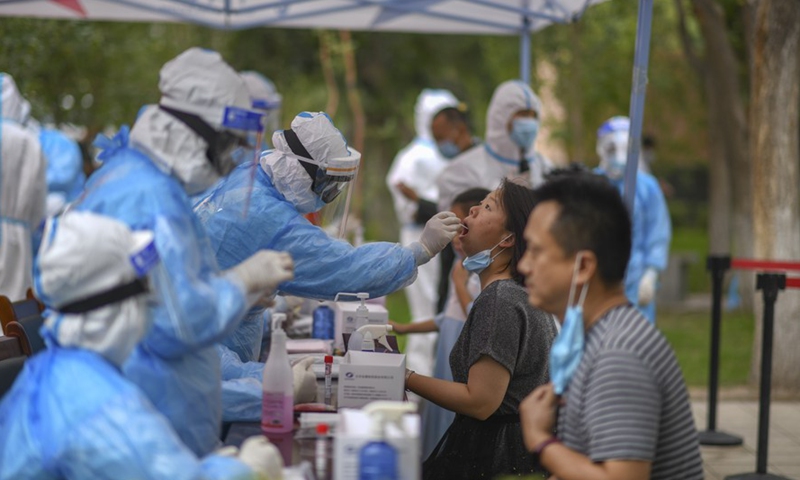Xinjiang’s latest COVID-19 outbreak ‘may have reached inflection point’
By Huang Lanlan Source: Global Times Published: 2020/7/31 22:03:36

Medical workers collect swab samples for residents at Tianshan District in Urumqi, northwest China's Xinjiang Uygur Autonomous Region, July 20, 2020. (Photo:Xinhua)
The latest round of the COVID-19 outbreak in Northwest China's Xinjiang Uygur Autonomous Region may have reached an inflection point, medical experts told the Global Times.Xinjiang reported 112 new confirmed cases on Thursday, 30 of which were former asymptomatic carriers. It reported zero new asymptomatic cases that day, the local government said on Friday.
The decrease of new asymptomatic cases shows to some extent that Xinxiang's epidemic situation is improving, virologists said. There is a large probability that the local epidemic will be basically under control within one or two weeks, estimated Yang Zhanqiu, a professor at the pathogen biology department under Wuhan University.
The number of new confirmed cases in Xinjiang may not increase in the coming days with local timely epidemic control efforts, Yang told the Global Times on Friday.
In capital city Urumqi, where 520 of Xinjiang's total of 523 cases have been reported since the latest outbreak began on July 16, the local government has carried out a compulsory home quarantine for all residents to reduce the virus transmission risks, said the Urumqi health authority.
Urumqi also started citywide nucleic acid testing on July 17. It had reported one confirmed and three asymptomatic cases on July 16 after months of zero new cases.
Yu Tou, a resident in the downtown Saybag district of Urumqi, said she has had two nucleic acid tests for free at her residential community on July 20 and 27. The tests were organized by community staffers, she recalled.
Having been staying at home for quarantine for two weeks with her husband, Yu said she doesn't feel it is that inconvenient thanks to the help from her residential community. She can buy food and daily necessities from nearby stores online, which later deliver the goods to her home, and community staffers pick up her garbage at the door, she added.
Friday marks this year's Corban Festival. Instead of visiting the homes of her Muslim friends for a face-to-face greeting, Yu said this year they had to greet each other via WeChat and telephone calls. "But it didn't much reduce the festival atmosphere," she told the Global Times on Friday.
The Urumqi government has made efforts to ensure the supply of festival-related materials while fighting against the virus, deputy mayor Song Yajun said on Thursday. The city plans to put 200 tons of fresh mutton and 150 tons of beef into the local market between July 29 and August 12, he added.
Xinjiang's response to this round of the virus outbreak has been fast and targeted, Yang said. Now the key thing is to figure out the cause of infection for the region's first COVID-19 patient in the latest outbreak, he noted.
This outbreak may come under control before long if the virus that infected this patient originated in China, Yang said.
But the situation will be more complicated if this COVID-19 [type] was imported from overseas, as it may not be picked up by China's nucleic acid testing, Yang said. "We should not take it lightly," he added.
Posted in: SOCIETY